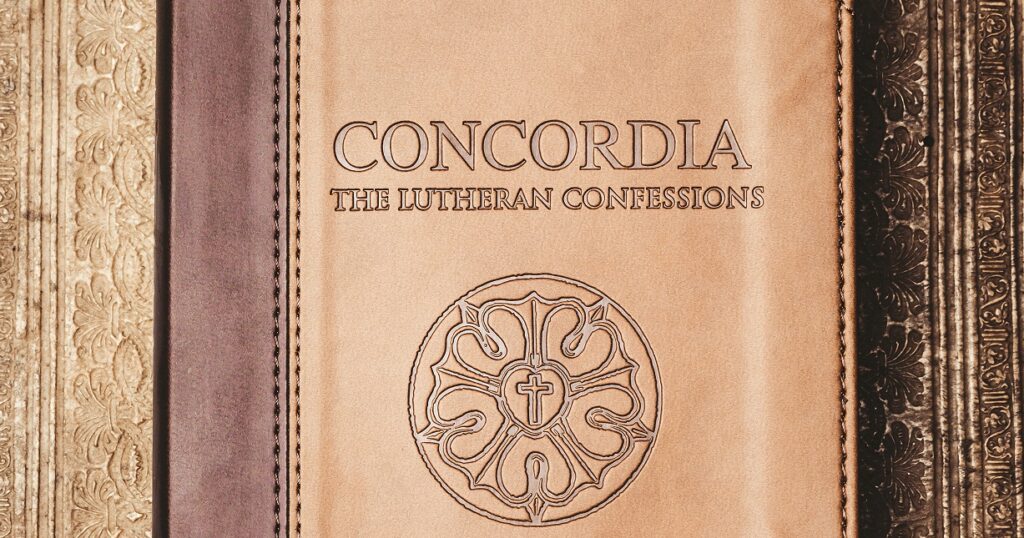The October 2025 issue of The Lutheran Witness provided definitions and explanations of nine different words we use often as Lutherans — and unpacked how other denominations use those terms differently. We are sharing several of these online throughout the month of October.
Definition:
Inspiration is God’s divine action whereby the Holy Spirit breathed into the biblical authors not only the ideas but the very words of Holy Scripture, making every part of the Bible the infallible, inerrant Word of God.
Lutherans Confess:
“All Scripture is breathed out by God,” wrote Paul in 2 Timothy 3:16. Lutherans teach “verbal inspiration,” meaning that every word of Holy Scripture was inspired by the Holy Spirit. We believe that this inspiration extends to all of Scripture.
Through His Word, God reveals Christ’s atoning work on the cross for the salvation of humanity. However, Lutherans do not believe that this core message is the only thing in Scripture that is inspired. Lutherans teach that all of the details in Scripture, such as doctrine, chronology, historical events, geography, etc., were all inspired by the Holy Spirit.
God is the true Author of every word of Scripture — which makes it qualitatively different from all other human writings. Since God cannot err, His inspired Word contains no errors in any part (LC IV 57). As Psalm 12:6 puts it, “The words of the Lord are pure words, like silver refined in a furnace on the ground, purified seven times.” Because Scripture is God’s inerrant Word, Lutherans hold that the Bible is “the judge, rule, and norm. According to them — as the only touchstone — all teachings shall and must be discerned and judged to see whether they are good or evil, right or wrong” (FC Ep, Rule and Norm, 7). All right doctrine and theology are judged according to the standard of Scripture.
Unpacking Other Definitions:
- Subordinated to church tradition: While the Roman Catholic Church acknowledges that Scripture is “inspired,” the language of Vatican II teachings leaves room for potential errors in Scripture on non-salvific matters. Catholics also subordinate the authority of Scripture to church tradition and papal authority and maintain that Scripture’s meaning and authority are determined by the Catholic Church’s magisterium. In other words, in Catholic theology, “inspiration” does not guarantee Scripture’s independent authority — the Scriptures need the church to authoritatively interpret them. Similarly, Orthodox theology sees Scripture and tradition as two aspects of a single divine revelation, with the church’s liturgical and patristic tradition serving as the interpretive key to Scripture’s meaning.
- Subject inspiration: Mainline Protestant denominations often adopt something called “subject inspiration,” the view that God inspired the biblical writers’ thoughts or persons rather than their words. This position leaves room for significant human error in Scripture while maintaining that it contains God’s revelation. Some describe the Bible as “containing” God’s Word rather than “being” God’s Word, making human reason and experience judges over scriptural authority. The historical-critical method often assumes that errors exist, requiring scholarly reconstruction of the “original” message — which often dismisses things like prophecy and miracles.
- Propositional truths: Many evangelical denominations strongly affirm biblical inerrancy, often with language similar to the Lutheran Confessions. However, their understanding frequently lacks the Christocentric focus that characterizes Lutheran interpretation. Evangelicalism sometimes treats Scripture as a collection of propositional truths rather than as the living Word that creates faith through Law and Gospel, thus divorcing biblical authority from its proper purpose of proclaiming Christ.
- Ongoing inspiration: While generally affirming biblical inspiration, many Pentecostal and charismatic movements emphasize ongoing revelation through prophecy, tongues and direct spiritual experiences. This can diminish Scripture’s unique authority by placing contemporary “revelations” on equal (or even superior) footing with biblical texts. This can subordinate the biblical texts to subjective spiritual experiences.
From Scripture:
“All Scripture is breathed out by God and profitable for teaching, for reproof, for correction, and for training in righteousness” (2 Tim. 3:16).
From Our Confessions:
“We know that God does not lie [Titus 1:2]. I and my neighbor and, in short, all people, may err and deceive. But God’s Word cannot err” (LC IV 57).






RE: “Many evangelical denominations strongly affirm biblical inerrancy, often with language similar to the Lutheran Confessions. However, ….”
Must we be so hasty to say, “However,…”? Might we pause to rejoice that outside our Lutheran tribe God in his mercy has brought millions of people to embrace the Scriptures as his own inspired Word, and that people continue to be brought from death to life as a result?